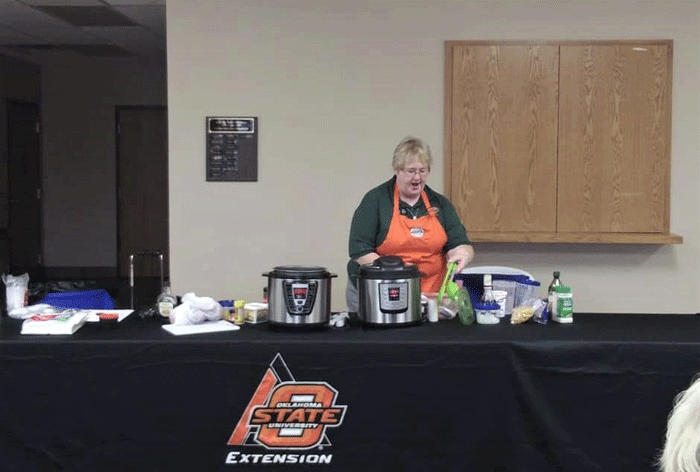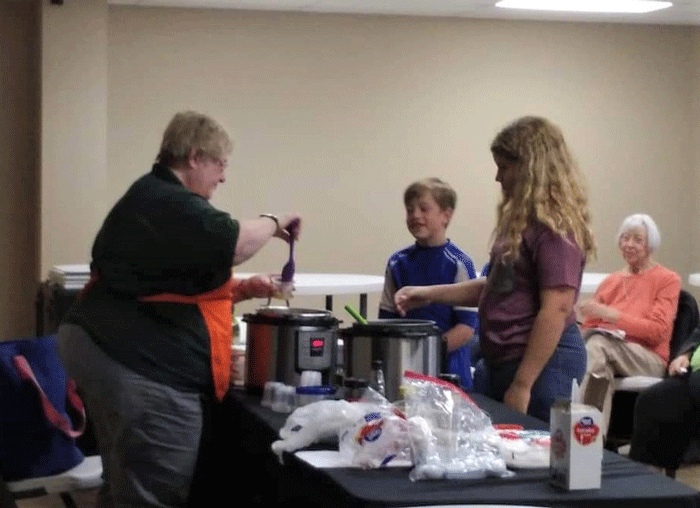
OHCE (Oklahoma Home and Community Education)
The Jefferson County OHCE will meet Tuesday, November 20 at 11:30 a.m. at the Waurika Sr. Citizens Center. Come to eat lunch with us, stay and listen to our program “Repurposed Jars” presented by Tara Brown, Jefferson County OSU Extension Educator, FCS/4-H Youth Development. OHCE is open to any person who wishes to join. Melicia McFadden is our president and Deborah Farrar is our treasurer.
Tai Chi: Moving for Better Balance
Tai chi: Moving for Better Balance is an evidence-based program that focuses on improving functional ability, such as balance and physical function, to reduce fall-related risks and frequency.
The series of slow continuous movements of Tai chi: Moving for Better Balance help those participating reduce stress, increase balance and flexibility as well as learn relaxation to improve their overall mind, body, and spirit. Tai chi: Moving for Better Balance is for people at all levels of mobility and can be done while sitting. Tara Brown recently received her certification through the Injury Prevention Service, Oklahoma State Department of Health to teach this program.
The class is held at 9:30 a.m. Mondays through November 19th (and longer if requested), at the Ringling Community Building. We have begun a Thursday evening class from 5 p.m. – 6 p.m. also at the Ringling Community Building. There is no cost to participate; come to join us!
Co-Parenting for Resilience: Divorce or separation is not an easy or favorable decision, especially when minor children are in the home. A class is available for divorcing or separating parents with minor children living in the home. My next class is scheduled for 1 p.m. Tuesday, December 11, 2018. Pre-registration is required. Call Jefferson County OSU Extension Office at 580-228-2332 for registration information. This class is mandatory by law in Oklahoma and is also valuable for Grandparents and other relatives of minor children going through a divorce or separation.
Holiday Cooking under Pressure was presented by Tara Brown, Extension Educator for Family and Consumer Sciences/4-H Youth Development Wednesday, November 7 at the Ringling Community Building. Tara spoke on the “fairly new” concept of cooking with Electric Pressure Cookers. There are several models from Instant Pot to Crock Pot to Power Pressure and more; each with the concept of using one pot to cook with pressure (like the Pressure cookers we use for the top of the stove) to slow cooking all in one pot. Tara prepared Beef Stroganoff in one cooker and Cinnamon Apple Slices in another. Sample tastings and recipes were provided to the group of 16.
Keep your pets safe during winter weather.
For pets that spend a good deal of time romping in the backyard or lounging in a patch of sunshine on the deck, the arrival of winter may be a rude awakening and cause of concern for safety.
Before Oklahoma experiences a deep freeze, pet owners need to make sure their pets are well-cared for when the temperature begins to fall, said Dr. Paul DeMars, associate professor in Community Practice at the Center for Veterinary Health Sciences at Oklahoma State University.
“As pretty and soft as your pet’s fur is, it isn’t necessarily the perfect insulator, especially when the temperatures are extreme or when the fur gets wet,” DeMars said. “Compare it to being outside wearing a t-shirt when it’s below freezing. Your pet’s toes, nose and ears are especially susceptible to winter weather, too.”
If you suspect your pet has frostbite, cover the animal with warm towels. Gently pat dry the affected area and contact your veterinarian.
While winter weather can be hard on any pet, very young animals, as well as older dogs and cats, should not be kept outdoors. DeMars said these young pets simply do not have the fat, metabolism or the full fur coat they need to stay warm.
The best option for pet safety during the winter is to keep them indoors. If your pet lives outside fulltime, it is imperative to provide adequate shelter from the elements. A covered enclosure with blankets or clean hay/straw/cedar shavings is a must. Another option is a heated floor mat. Check with your local pet store to see what is available.

“Try to face the opening of the shelter away from the wind. Also, if it rains and the bedding gets wet, replace it with dry bedding,” DeMars said. “Wet bedding can grow bacteria and mold, which are not healthy for your pet.”
It is no secret exercise is good for both humans and their pets. For those who enjoy a nice walk with your pet, sidewalks and walking trails are likely to have been salted if there is ice or snow on the ground. While this is beneficial for humans to help keep them from slipping and sliding, salt can cause irritation on an animal’s foot pads.
Not only is the weather a concern for your pet, but the chances of exposing your pet to life-threatening chemicals also increases. Leaky radiators can leave pools of antifreeze in your driveway and is both a winter and summer issue. Although the sweet taste of antifreeze is appealing to your pet, it can be deadly, even in very small doses.
“Antifreeze is highly toxic and absorbs quickly into your pet’s system. The kidneys are the most affected organs and can shut down completely within 12 to 24 hours in cats and 36 to 72 hours in dogs,” DeMars said.

Another outdoor danger is animals who seek protection from the winter weather in dangerous places. Before starting and moving your vehicle, check under the hood and in the wheel wells to ensure there are no animals hiding.
Because it takes a few more calories to keep warm in the winter, your pet may need a little extra food. For pets who stay outside, make sure the water in their water bowls is not frozen.
“Winter weather will mean your pets require a little extra care to ensure their safety,” DeMars said.
Story by Trisha Gedon
Communications Specialist
Agricultural Communications Services
159 Ag North
Stillwater, OK 74078
405-744-3625
trisha.gedon@okstate.edu